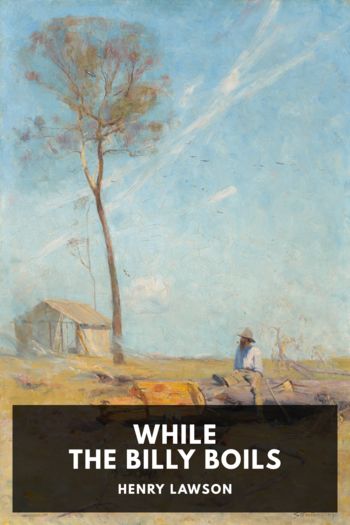While the Billy Boils, Henry Lawson [hardest books to read .txt] 📗

- Author: Henry Lawson
Book online «While the Billy Boils, Henry Lawson [hardest books to read .txt] 📗». Author Henry Lawson
He turned towards the street end of the alley and gave a low whistle. Out under the lamp from behind the corner came a long, thin, shambling, humpbacked youth, with his hat down over his head like an extinguisher, dragging a small bony horse, which, in its turn, dragged a rickety cart of the tray variety, such as is used in the dead marine trade. Behind the cart was tied a mangy retriever. This affair was drawn up opposite the door.
“The cove with a cart” was introduced as ‘Chinny’. He had no chin whatever, not even a receding chin. It seemed as though his chin had been cut clean off horizontally. When he took off his hat he showed to the mild surprise of strangers a pair of shrewd grey eyes and a broad high forehead. Chinny was in the empty bottle line.
“Now, then, hold up that horse of yours for a minute, Chinny,” said Bill briskly, “ ’relse he’ll fall down and break the shaft again.” (It had already been broken in several places and spliced with strips of deal, clothesline, and wire.) “Now, you chaps, fling yourselves about and get the furniture out.”
This was a great relief to the push. They ran against each other and the doorpost in their eagerness to be at work. The furniture—what Mrs. A. called her “few bits of things”—was carried out with elaborate care. The ironing table was the main item. It was placed top down in the cart, and the rest of the things went between the legs without bulging sufficiently to cause Chinny any anxiety.
Just then the picket gave a low, earnest whistle, and they were aware of a policeman standing statue-like under the lamp on the opposite corner, and apparently unaware of their existence. He was looking, sphinx-like, past them towards the city.
“It can’t be helped; we must put on front an’ go on with it now,” said Bill.
“He’s all right, I think,” said Chinny. “He knows me.”
“He can’t do nothin’,” said Bill; “don’t mind him, Mrs. Aspinall. Now, then (to the push), tie up. Don’t be frightened of the dorg-what are you frightened of? Why! he’d only apologize if you trod on his tail.”
The dog went under the cart, and kept his tail carefully behind him.
The policeman—he was an elderly man—stood still, looking towards the city, and over it, perhaps, and over the sea, to long years agone in Ireland when he and the boys ducked bailiffs, and resisted evictions with “shticks,” and “riz” sometimes, and gathered together at the rising of the moon, and did many things contrary to the peace of Gracious Majesty, its laws and constitutions, crown and dignity; as a reward for which he had helped to preserve the said peace for the best years of his life, without promotion; for he had a great aversion to running in “the boys”—which included nearly all mankind—and preferred to keep, and was most successful in keeping, the peace with no other assistance than that of his own rich fatherly brogue.
Bill took charge of two of the children; Mrs. Aspinall carried the youngest.
“Go ahead, Chinny,” said Bill.
Chinny shambled forward, sideways, dragging the horse, with one long, bony, short-sleeved arm stretched out behind holding the rope reins; the horse stumbled out of the gutter, and the cart seemed to pause a moment, as if undecided whether to follow or not, and then, with many rickety complaints, moved slowly and painfully up on to the level out of the gutter. The dog rose with a long, weary, mangy sigh, but with a lazy sort of calculation, before his rope (which was short) grew taut—which was good judgment on his part, for his neck was sore; and his feet being tender, he felt his way carefully and painfully over the metal, as if he feared that at any step he might spring some treacherous, air-trigger trap-door which would drop and hang him.
“Nit, you chaps,” said Bill, “and wait for me.” The push rubbed its head with its hat, said “Good night, Mrs. Ashpennel,” and was absent, spook-like.
When the funeral reached the street, the lonely “trap” was, somehow, two blocks away in the opposite direction, moving very slowly, and very upright, and very straight, like an automaton.
“Brummy Usen”We caught up with an old swagman crossing the plain, and tramped along with him till we came to good shade to have a smoke in. We had got yarning about men getting lost in the bush or going away and being reported dead.
“Yes,” said the old whaler, as he dropped his swag in the shade, sat down on it, and felt for his smoking tackle, “there’s scarcely an old bushman alive—or dead, for the matter of that—who hasn’t been dead a few times in his life—or reported dead, which amounts to the same thing for a while. In my time there was as many live men in the bush who was supposed to be dead as there was dead men who was supposed to be alive—though it’s the other way about now—what with so many jackaroos tramping about out back and getting lost in the dry country that they don’t know anything about, and dying within a few yards of water sometimes. But even now, whenever I hear that an old bush mate of mine is dead, I don’t fret about it or put a black band round my hat, because I know he’ll be pretty sure to turn up sometimes, pretty bad with the booze, and want to borrow half a crown.
“I’ve been dead a few times myself, and found out afterwards that my friends was so sorry about it, and that I was such a good sort of a chap after all, when I was dead that—that I was sorry I didn’t stop dead. You see, I was one





Comments (0)